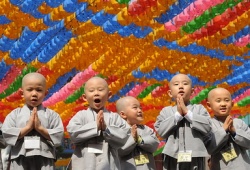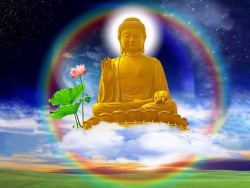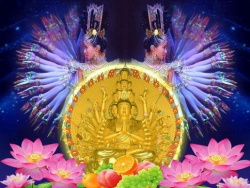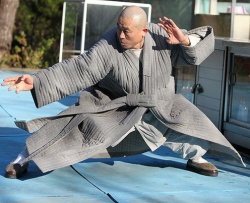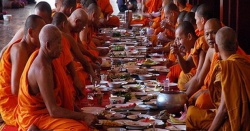Six Bad Monks
Six Bad Monks
By Indrajala (Jeffrey Kotyk)
In early Buddhism we find mention of the “Group of Six Bhikṣus”, who are notable for being trouble makers whose actions resulted in numerous rules being laid down by The Buddha. In general they are named as Nanda, Upananda, Aśvaka, Punarvasu, Chanda, and Udāyin. Udāyin might have been Kālodāyin given alternate lists. Some of their actions are rather amusing to read about, but it does reveal that rather immature behavior did happen in the early Sangha, which was clearly not made up entirely of mature and dedicated practitioners as it is often believed. There is value in recognizing this because although we might be inclined to think The Sangha in The Buddha's time was quite advanced, stoic and harmonious (and a lot of popular media tries to literally paint this image), in reality it had many of the same problems as any other human organization past or present. This is especially evident after reading the Vinaya, which is an all too often ignored area of the canon.
For instance there is a rule that prohibits bhikṣus from striking other bhikṣus. Vinaya rules only came to exist as a result of problematic situations which required disciplinary measures to be enacted. In other words, rules only came to exist because of misdeeds. This means that at some point a bhikṣu (or bhikṣus) struck someone, which resulted in The Buddha establishing a formal rule against it. The Mahāsāṃghika Vinaya provides us with an account of what happened.
- 《摩訶僧祇律》卷18: 「佛住舍衛城。廣說如上。爾時六群比丘於禪坊中起。以拳觸十六群比丘頭。即便大啼。佛聞啼聲。知而故問。是中何等小兒啼聲。答言。是六群比丘於禪坊中起。 以拳觸十六群比丘頭。是故啼聲。佛言。呼六群比丘來。來已佛具問上事。汝實爾不。答言。實爾。佛言。何以故爾。答言。為戲樂故。佛言。癡人。此是惡事。惱 諸梵行人而反言樂。佛語六群比丘。莫輕彼人。彼人若入定者。以神足力擲汝著他方世界。汝常不聞。我以無量方便。於梵行人所應起身口意行慈。供養恭敬。云何 作是惡不善事。此非法非律。非如佛教。不可以是長養善法。佛告諸比丘。依止舍衛城住者。皆悉令集。以十利故。與諸比丘制戒。乃至已聞者當重聞。若比丘打比 丘者波夜提。」(CBETA, T22, no. 1425, p. 375, c28-p. 376, a13)
- The Buddha was residing in the city of Śrāvastī as explained above. At that time the group of six bhikṣus stood up in the Meditation hall and with their fists struck the heads of the sixteen bhikṣus, who then let out great screams. The Buddha heard the screams. He knew what it was, but intentionally asked, "What children are screaming here?"
- They replied, "The group of six bhikṣus here stood up in the Meditation hall and with fists struck the heads of the sixteen bhikṣus. This is why we screamed."
- They came and The Buddha questioned them about the aforementioned incident.
- "Did you really do it?"
- They replied, "It is true."
- The Buddha said, "Why did you do it?"
- They replied, "For fun."
- The Buddha said, "Fools! This is an unwholesome act. To disturb practitioners and then say it is fun!"
- The Buddha spoke to the group of six bhikṣus, "Do not belittle them. If they are in deep Meditation they could fling you into another World with their supermundane abilities. You never listen. I have tried immeasurable ways to have you cultivate Kindness of Body, speech and Mind towards practitioners which they deserve, Making Offerings and venerating them. How could you do such an unwholesome and non-virtuous act as this? This is adharma and undisciplined. It is not like The Buddha's teachings. You cannot cultivate virtuous dharmas like this."
- The Buddha addressed all the the bhikṣus in Śrāvastī who had assembled. “I will establish a precept for bhikṣus with the ten reasons in Mind. Even those who have already heard it should listen well. It is a pāyattika offence for a bhikṣu to strike a bhikṣu.”
Curiously the following precept in the Mahāsāṃghika Vinaya is almost identical in content to this one except the group of six bhikṣus raise their hands "like knives" and then proceed to threaten to strike the meditators in the face. After the incident The Buddha declares that such a gesture of the hand constitutes a pāyattika offense. A pāyattika offense is the third worst category of offense a bhikṣu could commit, requiring them to properly confess it. It is not like a pārājika offense which results in immediate permanent ejection from The Sangha.
This kind of behaviour wasn't limited to males. There was also a bhikṣuṇī (nun) named Sthūlanandā who was rather famous for causing incidents which resulted in the Bhikṣuṇīs having additional rules laid upon them. She is the reason why a bhikṣuṇī may not walk along a bridge with a bhikṣu.
The Mūlasarvāstivāda Vinaya Kṣudraka Vastu records the incident as follows.
- 《根本說一切有部毘奈耶雜事》卷31:「爾時具壽大迦攝波。於小食時著衣持鉢入城乞食。時吐羅難陀苾芻尼。從外而來欲入住處。遇河水泛溢。見迦攝波在板橋上。吐羅難陀作如是念。此愚鈍物今可治之。速往橋邊用力踏板。時迦攝波遂即落河。衣服並濕鉢沈水底錫杖隨流。迦攝波曰。姊妹。汝無過犯。」(CBETA, T24, no. 1451, p. 359, b28-c5)
- At that time it was time for a small meal [breakfast] and Venerable Mahākāśyapa grabbed his bowl and entered the town to beg for Food. Sthūlanandā Bhikṣuṇī came out and wanted to enter a dwelling. She came to the river water which was flowing. Seeing Kāśyapa on top of the bridge Sthūlanandā Thought, “Here is a dimwit. Now I can get him!” She quickly went over to the side of the bridge and forcefully stomped on the board. Kāśyapa then fell into the river. His Clothes were soaked, his bowl sank to the bottom of the water and his staff floated away. Kāśyapa said, “Sister, you are not guilty of a transgression.”
This incident, which is one among many, illustrates how in the early Sangha there were childish and immature members, both male and female. Many of the rules which seem incomprehensible to us now were a result of behaviour like this.
Before The Buddha passed away he told ĀNanda that The Sangha could do away with all the “minor rules”, but unfortunately ĀNanda, who was Grief stricken at the time, failed to ask which of the rules were minor. This is why Mahākāśyapa declared after a discussion with the assembly that all the rules would be maintained and that none would be abandoned. Consequently these rules became precepts which would be formally transmitted in an institutionalized fashion with ordinands vowing to uphold them under penalty of falling into various hells (note: the legal requirement for becoming a bhikṣu/ bhikṣuṇī is vowing to uphold all these rules). For example, strictly speaking if you are a bhikṣu and gesture with your hand as if it were a knife it constitutes a pāyattika offence, which if not properly confessed it is said results in you falling into Hell.
It is unclear if The Buddha himself really stated this. The spirit of many of these rules seems to be just general house rules that had to be laid down because of immature behaviour. Do they entail some kind of sacredness? Is there anything holy about them? The Vinaya can be painted as a kind of program for spiritual development, but taking a step back much of it from the scholarly point of view just appears as mere house rules for young men and women who were prone to cause trouble.
Alcohol for example (see my previous post here) was prohibited only because the Monk Svāgata had too much to drink and passed out (but not before vomiting all over himself depending on the version of the story you read). Until that time members of The Sangha could and clearly did receive and drink Alcohol, which we can assume The Buddha was well aware of. In my readings this fact has always been ignored as authors just write about the detrimental effects of Alcohol without explaining why it was banned in the early Sangha.
Of course a lot of the rules make sense for practitioners. Prohibiting sex is important if you are to break free from the binds of desire, which is a requisite for attaining Dhyāna. Still, prior to a number of incidents occurring there was no formal rule against it and it seems it was just assumed that as one of The Buddha's disciples you would refrain from the act and devote yourself to your practice. The first few years of The Sangha had no Vinaya or formal rules, being made up of mature and dedicated disciples, many of whom were already seasoned yogis. After some time the membership increased and before long problematic characters entered The Sangha and started causing problems, which The Buddha had to deal with. The rules were relevant at the time, but became fossilized in due course and the whole institutional apparatus for upholding them became a sanctified duty required of anyone wanting to formally be recognized as a bhikṣu/bhikṣuṇī.
Naturally much of the Vinaya has been conveniently ignored throughout history despite the formal act of taking on all the vows being a rite of passage to becoming sanctified clergy. How the Vinaya has been interpreted, misunderstood and modified will be the subject of future posts.
Source
by Indrajala (Jeffrey Kotyk)
sites.google.com/site/dharmadepository

